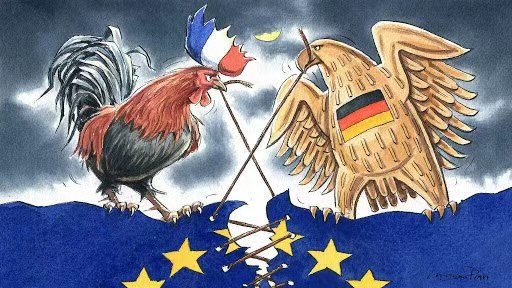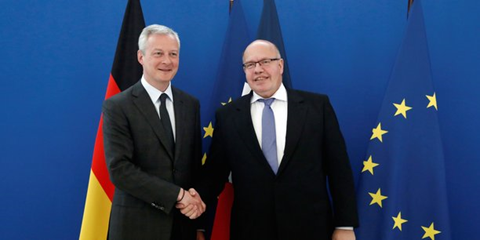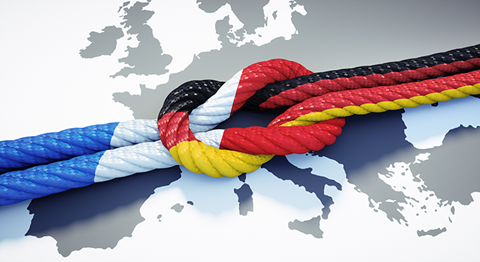
Last week, Bruno Le Maire, the French Minister of the Economy, visited Berlin to discuss economic recovery plans with Peter Altmaier, the German Minister of the Economy and Energy. LesEchos, a daily financial newspaper in France, gave an interview with both to have an insightful understanding of several key issues that two nations and the EU need to deal with.

Germany withstood the first wave of Covid-19 well, but France is currently doing better in stemming the spread of the pandemic. What do you learn from it?
Altmaier: The recipe for the success of Franco-German friendship is that we learn from each other. We must constantly adapt to this pandemic as it is an unprecedented situation. This is why Germany must now take additional measures, which will require considerable effort next year.
Le Maire: Germany and France have adopted the same economic responses: partial unemployment, loans guaranteed by the State, exemption from business charges and solidarity funds for SMEs and TPE. We have built a closer Franco-German cooperation and above all, a European economic model of solidarity in the face of the crisis.
Did Germany’s strict fiscal policy and the strength of its exports have decisive factors during this crisis?
Altmaier: We do indeed have a dynamic and efficient entrepreneurial fabric and we are reaping the fruits of the major reforms undertaken since the early 2000s. French economic dynamics are weaker because these reforms were initiated later. But since taking office, Bruno has put all his energy into consolidating public finances. I am confident that these efforts will have good results, just needs more time.
Le Maire: The reforms led for three years by Emmanuel Macron have yielded results: France had, at the start of 2020, one of the best levels of growth in the eurozone. The decisive question for the future of the EU is to return to sustainable growth. This implies the continuation of structural reforms and the rapid implementation of the recovery plan of 100 billion euros, which is mainly based on the decarbonization of the industry. We must count on very close cooperation with Germany, in particular in the industrial sectors. More Franco-German cooperation means more growth for the whole of Europe.
The EU has agreed to a €750 billion recovery plan, but Poland and Hungary are blocking it. Should other states renounce the principle of the rule of law to save that of solidarity?
Altmaier: Respecting law is part of the genetic heritage of the EU, and solidarity is more than ever necessary to get through the crisis together.
Le Maire: Poland and Hungary need the recovery fund and these countries are major beneficiaries of European funds. For the peoples and businesses of these two countries that the recovery plan and the European budget needs to be released as quickly as possible. Our unity is at stake. On the one hand, facing China, which could emerge as a winner from the crisis and which aims for greater autonomy. On the other hand, in the face of the crisis itself, which requires us to show solidarity. Do we want to stay in the global economic race? If this is the case, we need the European recovery plan to enter into force as soon as possible.
Do you fear a major wave of bankruptcies in the EU in the coming months which would lead to a new banking crisis?
Altmaier: We have learned the lessons of the 2008 financial crisis by reacting quickly and comprehensively. Despite the pandemic, the number of business bankruptcies has remained limited. The longer it lasts, the more we will have to face new bankruptcies. Germany learns the lessons of the last six weeks and definitively stops the second wave of the pandemic.
Le Maire.: We anticipate fewer bankruptcies in 2020 than in 2019. The State responded quickly and massively to protect our economy and provide the necessary liquidity for businesses. There are no particular concerns for the banks or for the deposits of savers. The latest reform which creates a safety net in the European Stability Mechanism provides an additional guarantee for savers.
Isn’t it time to speed up the Banking Union by agreeing on a European guarantee fund?
Altmaier: The backstop, with which we created the safety net that Bruno talks about, is already a historic compromise. The urgency is to preserve the economic substance of our companies. We must define the industrial priorities to be implemented in the coming months.
Le Maire: The priority is clear: to coordinate our economic policies. We need to strengthen even more this coordination. Beyond the immediate response to the crisis, we must not lose sight of the objective of integrating the eurozone. First on the Capital Markets Union and the Banking Union. The biotech sector, with the development of coronavirus vaccines involving billions of euros in investment, shows us how much innovation needs deep capital markets. Then on the continuation of work for the creation of a real budget for the eurozone.
The European budget needs new resources: does the European tax on digital services have a chance to see the light of day?
Altmaier: The EU’s new own resources will be all the more necessary as the European desire to achieve carbon neutrality in 2050 will require considerable resources.
Le Maire: The digital giants are the primary beneficiaries of the crisis and pay a much lower level of taxes than European small and medium-sized businesses. It is both unfair and profoundly ineffective. We continue to want an international solution as quickly as possible within the framework of the OECD for fair and efficient taxation of these giants. I hope the next American administration will help us with this. If this is not the case, the European Union will have to take its responsibilities and put in place European taxation.
You have increased the number of joint industrial policy initiatives. Is French interventionism winning over the German government?
Altmaier: What is great about Franco-German cooperation is that something new is created out of long-standing oppositions, which combines the strengths of both perspectives. Airbus was created in the 1960s because the State became an entrepreneur. Our new industrial policy combines State support for innovation and its implementation by private companies. In other words, the state supports private investment but does not replace it. There is also close cooperation between European partners.
Le Maire: We changed the political logic in a few months by investing heavily in critical technologies of the future. Take the batteries: until now, we sourced 85% from China or South Korea, from now on we will produce them ourselves in Europe from 2021. We want to do the same for semiconductors: today, Europe represents only 10% of the world market of 440 billion euros. We have agreed with Germany and 11 other EU countries to design and manufacture the chips that power our smartphones and computers in Europe. Likewise, thanks to the initiative that Peter has taken with Gaia-X, we will be able to store our sensitive data securely.
How much will it cost taxpayers before the European chip industry can compete with that of Asia and the United States? Is European sovereignty at this price?
Altmaier: We are not looking for self-sufficiency or autonomy, but we cannot accept that a large part of the creation of value in the fields of the future takes place completely outside Europe. This would have serious consequences for the prosperity of our countries. That is why we have decided to support private companies in selected fields and to create strong incentives for investment. State subsidies are still only a fraction in which companies themselves invest. This ensures that the principles of the market economy apply.
Le Maire: You are right, sovereignty has its price. But it allows us to continue to play a leading role in the global economy. We focus on strategic technologies in which Europe already has strong businesses. In the semiconductor sector, for example, I am thinking of STMicroelectronics, and in the hydrogen sector, I am thinking of Air Liquide.

What do you expect from the Biden administration in terms of trade policy?
Altmaier: Our goal is to agree on a reliable outlook for Airbus as well as for Boeing. I think it will be important for our American friends to relaunch and deepen the Euro-American partnership. This includes solving the problems of the past.
Le Maire: We must leave the era of trade disputes between the EU and the States s United. We are partners, not adversaries. If, on the contrary, we continue to impose retaliation, there will be only one winner in the Airbus / Boeing case: the Chinese aircraft manufacturer Comac
Can the EU and the United States find a common line about China?
Altmaier: Europe cannot remain indifferent to the conflicts between the United States and China, its main trading partners. So we must not think in terms of alternatives but in terms of how to promote a fair and market-based world trade system. This includes making the World Trade Organization operational again.
Le Maire: The pandemic has confirmed to us that the sovereignty and autonomy of Europe are essential. The task will therefore be to relocate part of the value chains in Europe. I am thinking of the sectors that we have already talked about, batteries, semiconductors, or space. Finally, we must take climate objectives into account in the way we do business. Global warming is a fundamental challenge for all of us.
(Source: LesEchos / La Tribune / EIT Health / Financial Times)



